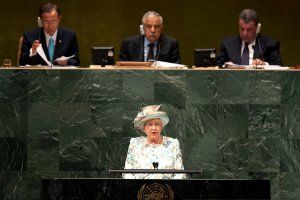
She is an unlikely emblem of the new. Queen Elizabeth II's chief public virtue, in fact, has long seemed to be her stability and sturdiness. In introducing her to the United Nations General Assembly last week, Secretary-General Ban Ki-moon said as much, referring to the British monarch as an "anchor for our age."
Her Majesty's ensuing message, though, was decidedly modern—and strikingly multilateralist, especially considering that she, as a hereditary sovereign, is the embodiment of a kind of unilateralism. "It has perhaps always been the case that the waging of peace is the hardest form of leadership of all," Elizabeth said. "I know of no single formula for success, but over the years I have observed that some attributes of leadership are universal, and are often about finding ways of encouraging people to combine their efforts, their talents, their insights, their enthusiasm, and their inspiration, to work together."
Given her audience and the constitutional restraints on her role—the personification of political life, she must be above politics—Elizabeth's brief address could be read as an exercise in ceremonial conventionality. Yet her little-noted remarks offer a meditation on globalism and post-imperialism from a woman whose ancestors ruled much of the world. For American conservatives who worry that President Obama (or, really, any Democratic president) veers dangerously close to "one worldism," the queen's speech in New York serves as an inadvertent endorsement of a habit of mind in which power, both military and economic, is best exercised cooperatively rather than coercively. Saluting the U.N.'s diplomatic and relief work, she specifically cited the challenges of terrorism and climate change; the latter is of special concern, she said, for a "careful account must be taken of the risks facing smaller, more vulnerable countries, many of them from the Commonwealth."
What does Elizabeth really believe about politics? Is she more of a Cameron than a Clegg, or does her ideology run in a Blair-Brown direction? She keeps such views private, and that is precisely the way she wants it. "The fact is that one of the great sources of her strength is that she so effectively conceals her personal opinions on the U.N. or on foreign policy," says Sally Bedell Smith, who is at work on a forthcoming biography of the queen to be published in conjunction with the 60th anniversary of Elizabeth's accession to the throne. "But she will not say anything she does not believe—she won't say 'very' unless she means 'very.' "
What she takes very seriously—and I use that "very" advisedly—is the British Commonwealth, the loose association of 54 countries of which she is the titular head. There is no single superpower in her realm; she came to the throne in 1952 in the aftermath of World War II, a conflict in which the U.K. saved freedom but lost an empire. She has spent the last half century offering the Commonwealth a kind of subtle but steady rhetorical leadership—not unlike that provided by the U.N.
In a world of asymmetrical threats—terror, nuclear proliferation, disease, poverty, and climate change—multilateralism is not, to borrow an image from Richard Haass of the Council on Foreign Relations, a policy of choice but of necessity. This does not mean America ought to go limp. Quite the opposite, in fact: the projection of our strength is magnified when we project it in concert with allies, whether through the U.N., NATO, or some provisional force created for a given military or policy purpose.
Foreign-policy doctrines are, in my view, chiefly useful in retrospect, not in real time, for the making of policy is almost always provisional, subject to the forces and the exigencies of a given moment. Which is why if we have to go it alone, we will. We learned how from Elizabeth's first prime minister, Winston Churchill. But those hours will prove the exception, not the rule.
The rule is a world like Elizabeth's Commonwealth. And the work endures. Quoting the late U.N. secretary-general Dag Hammarskjöld, the queen said, " 'Constant attention by a good nurse may be just as important as a major operation by a surgeon.' Good nurses get better with practice; sadly, the supply of patients never ceases."
It took two additional decades and three additional presidents, but we have at last arrived at the post–Cold War new world order George H.W. Bush spoke of in the wake of the fall of the Berlin Wall and Saddam Hussein's invasion of Kuwait. It is a global, not a unipolar, order in which America is the conductor of an orchestra of other countries—the most important figure on the scene, but one whose success depends on the performance of others.
Uncommon Knowledge
Newsweek is committed to challenging conventional wisdom and finding connections in the search for common ground.
Newsweek is committed to challenging conventional wisdom and finding connections in the search for common ground.





